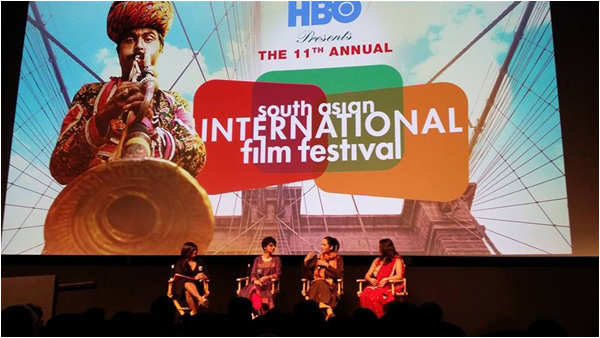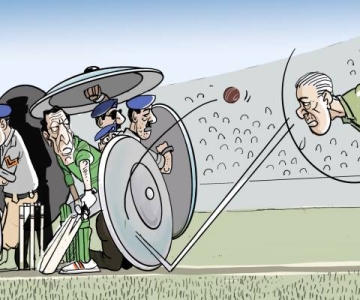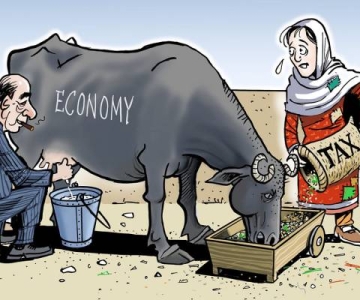I saw Dukhtar with the film’s protagonist, rekindling memories personal and political
It was utterly delightful when my friend Samiya Mumtaz now a celebrated actor informed me that she was visiting the US to attend the South Asian International Film Festival (SAIFF) where her recent film Dukhtar was being premiered. SAIFF is a formidable film premiere destination for South Asian filmmakers in the United States. Dukhtar is also Pakistan’s official entry for Oscars and there was absolutely no reason to miss the opportunity to see it. But more importantly, to meet Samiya who since her foray into stardom has become as stars do plain inaccessible.
We met outside the chaotic Penn Station in New York
We met outside the chaotic Penn Station in New York. The moment you emerge from this station life seems to take on a different hue, given the unreal energy of New York City, arguably one of the great man made wonders of our times. The train was late which basically meant we had a little time before reaching the festival venue, so we found a healthy eaterie that excited Samiya, given her lifestyle choices. Samiya who had wanted to be an organic farmer growing up realized her dream by working on a farm outside Lahore for many years. This led to the launch of Lahore’s first organic foods store Daali that has turned into a local brand impacting how food is viewed and consumed in gluttonous Lahore.
Samiya tells me about the film, her experience with the big screen and how involved she became with the project. A few hours later, we were in the packed auditorium where the film was to be shown. Prior to Dukhtar, a short film Veil was screened. Its director is a young enthusiastic woman Sreemoyee Bhattacharya who later told how the project was finished in a few days and the musical score was developed and finalized via Skype calls. Veil was visually strong and traced the evolving sexuality of a young man through a playful treatment of images, challenging the objectification of women’s bodies. It could have been fleshed out a bit more but for a young director the film was pretty impressive.
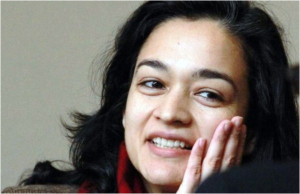
Finally Dukhtar was screened. Shot in the Gilgit-Baltistan region, the film is visually stunning. The theme of the film is powerful for it touches upon the widespread issue of child-marriage and how young girls are treated as instruments to settle scores by powerful men. Samiya plays the role of Allah Rakhi whose daughter Zainab is to be used as a means of achieving peace with a rival tribe. Allah Rakhi was married as a young girl as well and noting her loveless and miserable existence vows not to subject Zainab to the same. So she escapes with her daughter and is aided by a Punjabi truck driver, Sohail, deftly played by Mohib Mirza.
Sohail manages to bring both mother and daughter to a safe place in Attock and thus becomes an anchor for a defiant Allah Rakhi. The two also develop a level of intimacy. Sohail, we also find out became a Mujahid in the Afghan war and has left that life for a more secular vocation; his loveless existence enabling him to help Allah Rakhi and the daughter.
The problem with Dukhtar is that its editing is rather shoddy and the film, not unlike similar films from the region suffers from unnecessary length. The script sadly remains the weakest link of an otherwise powerful presentation.
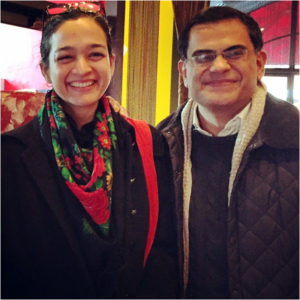
There are several holes in the storyline and instead of a cohesive script the film appears to be a melange of various stories and anecdotes woven together.
What pulls the film through are the extraordinary performances by Samiya and the child star Zainab, who is immensely gifted. Samiya remains natural and understated, refusing to indulge in melodrama. For this the director has to be credited as well who provided the space for Samiya’s performance to shine through. There is an everydayness about Samiya’s expression that makes her character appear real on the screen. At times there are flashes of urban mannerisms but overall the film is rescued by powerful performances.
Samiya has made incredible progress here from the TV soaps where she is often typecast, allowing little room for her talents to blossom further. Apparently, Samiya does argue with her directors and scriptwriters about the roles she has to play on television but these discussions do not always lead to desirable outcomes. It is only in Pakistan where a progressive actor is cast in stereotypical roles created by retrogressive best-selling writers.
At the festival, Dukhtar bagged the award for best director. The young filmmaker Afia Serena Nathaniel who later spoke at the event deserves credit for venturing into difficult territory. For a debutante her work is not too shoddy. The musical score of Dukhtar also works. With Rahat Fateh Ali Khan and Shafqat Amanat Ali singing a musical soiree can’t go wrong.
It was later that I realized that Samiya and I became friends as young staffers of the Aga Khan Rural Support Programme. We had another friend Sohail Ahmed, a brilliant architect who was restoring the Altit Fort. We were happy, inseparable. Sohail died a few years later and this is one loss that I have not been able to make sense of. Dukhtar’s locale and competent cinematography brought all those memories back. In a way, watching this film with Samiya acting and present was a milestone of sorts in our friendship.
The question and answer session at the film invoked some hilarious and at times sad comments. One member of the audience said that child marriage was not Pakistani culture and it was restricted to tribal areas. Punjab, apparently being mainstream Pakistan where such things don’t happen. Obviously for a NYC audience this was an outlandish remark indicating how the myopia becomes acuter with some Pakistanis abroad. Dukhtar for all its shortcomings is a timely reminder to all Pakistanis in the country and abroad that we have a plethora of issues to deal with. The first step is to overcome the culture of denial that we have woven into the fabric of our lives. From child labour to child brides and from sexual molestation, incest and rape our children are vulnerable and insecure. Ironically, at the same time we have the highest rates of population growth in the world. Cinema is a powerful medium and its portrayal of sensitive and complex issues is vital for public awareness. Dukhtar therefore is an important step towards a long, arduous journey ahead.
After getting all excited about Pakistani films entering forbidden territories, I was shocked to hear that Samiya Mumtaz has not been paid for the film yet. I don’t know the details, neither what she was promised but surely this is unprofessional and defeats the purpose of a cinematic portrayal of endemic injustice. But then this is Pakistan where this is the norm. I hope the film producers will change this sooner rather than later.
